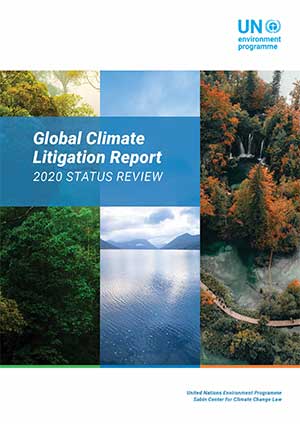The UNEP Global Climate Litigation Report: 2020 Status Review
UN Environment Programme (UNEP) report titled " The UNEP Global Climate Litigation Report: 2020 Status Review" has been released on 26th January which says that Climate litigation cases have spiked in recent years, making the courtroom increasingly relevant to efforts to address climate change around the world.
This report provides an overview of the latest update and scenario of climate change litigation globally, as well as an assessment of global climate change litigation trends. It finds that a rapid increase in climate litigation has occurred around the world.
Major findings of the report :
- It finds that a rapid increase in climate litigation has occurred around the world. In 2017 there were 884 cases brought in 24 countries. As of 1 July 2020, the number of cases has nearly doubled with at least 1,550 climate change cases filed in 38 countries. This growing tidal wave of climate cases is driving much-needed change.
- The report shows how climate litigation is compelling governments and corporate actors to purse more ambitious climate change mitigation and adaptation goals. It reports on key emerging trends in these cases, including the role of fundamental human rights connected to a safe climate and cases that bring to life the right to a healthy environment we now see in the constitutions of over 100 countries.
- It outlines how cases are forcing greater climate disclosures and ending “corporate greenwashing” on the subject of climate change and the energy transition. It reports how people are holding their governments to account, seeking to keep fossil fuels in the ground and challenging non-enforcement of climate-related laws and policies.
Some of the recent trends in climate litigation identified by the report include: Violations of "climate rights", i.e. cases are increasingly relying on fundamental human rights including the right to life, health, food, and water. Failures of governments to enforce their commitments on climate change mitigation and adaptation.
About UNEP :
The United Nations Environment Programme (UNEP) is the leading global environmental authority that sets the global environmental agenda, promotes the coherent implementation of the environmental dimension of sustainable development within the United Nations system, and serves as an authoritative advocate for the global environment.
The United Nations Environmental Programme (UNEP) was founded in June 1972 as a result of the Stockholm Conference on the Human Environment.
Since 1997, in response to the environmental requirements of Agenda 21, UNEP has also published its Global Environment Outlook (GEO), a comprehensive report on global state of the environment. Its headquarters are in Nairobi, Kenya.







